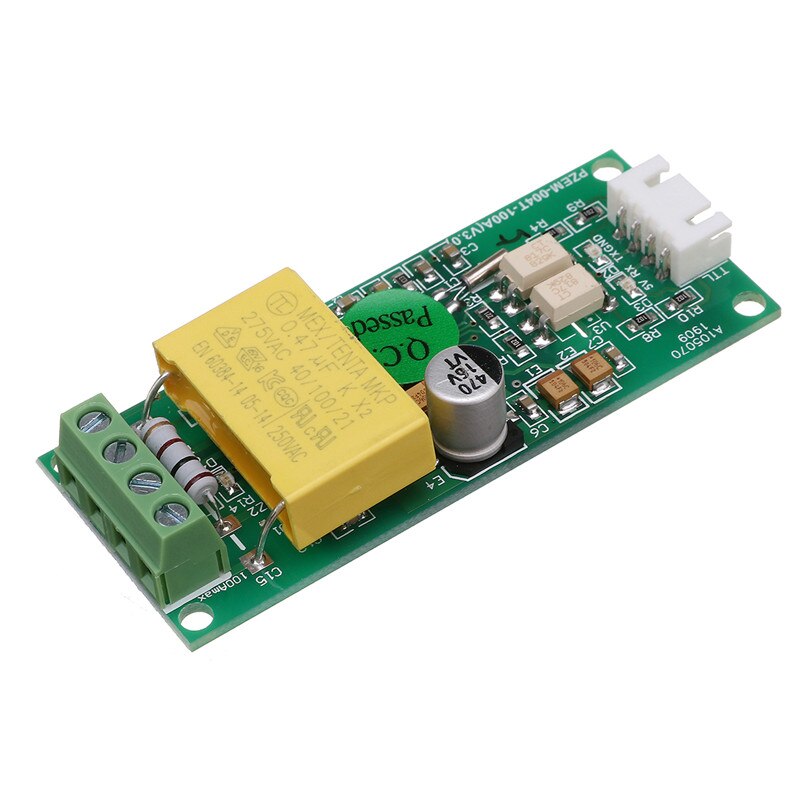Arduino library for Peacefair PZEM-004T-10A and PZEM-004T-100A v3.0 Energy monitor using the ModBUS interface.
The Version 3.0 PZEM is an upgraded version of the older PZEM-004T for which you can find the library Here
- Measures Voltage, Current, Power, Energy, Power Factor and Frequency (New in Version 3.0)
- 247 unique programmable slave addresses
- Enables multiple slaves to use the same Serial interface PZEM MulitDevice Demo
- Internal Energy counter up to 9999.99kWh
- Over power alarm
- Energy counter reset
- CRC16 checksum
- Better, but not perfect mains isolation
Make sure the device is connected to the AC power! The 5V only power the optocouplers, not the actual chip. Also please be safe, AC is dangerous! If you don't know what you are doing, you can die! You are responsible for your own stupidity. So don't be stupid.
This module is an upgraded version of the PZEM-004T with frequency and power factor measurement features, available at the usual places. It communicates using a TTL interface over a Modbus-RTU like communication protocol but is incompatible with the older @olehs library found here: https://github.com/olehs/PZEM004T. I would like to thank @olehs for the great library which inspired me to write this one.
| Function | Measuring range | Resolution | Accuracy | TODO: Realistic specifications |
|---|---|---|---|---|
| Voltage | 80~260V | 0.1V | 0.5% | |
| Current | 0~10A or 0~100A* | 0.01A or 0.02A* | 0.5% | |
| Active power | 0~2.3kW or 0~23kW* | 0.1W | 0.5% | |
| Active energy | 0~9999.99kWh | 1Wh | 0.5% | |
| Frequency | 45~65Hz | 0.1Hz | 0.5% | |
| Power factor | 0.00~1.00 | 0.01 | 1% |
* Using the external current transformer instead of the built in shunt
| MCU | Hardware Serial | Software Serial | Not Tested | Examples | Notes |
|---|---|---|---|---|---|
| ATmega168 | X | HardwareSerial SoftwareSerial | |||
ATmega328 (Arduino Uno) |
(:white_check_mark:) | ✔️ | HardwareSerial SoftwareSerial | HW Serial conflicts with Debug output. It can be used however without having any Serial Console output | |
ATmega2560 (Arduino Mega) |
✔️ | ✔️ | HardwareSerial SoftwareSerial | ||
| ESP8266 | (:white_check_mark:) | ✔️ | SoftwareSerial | HW Serial conflicts with Debug output Serial | |
| ESP32 | ✔️ | ❌ | HardwareSerial | SW Serial not really needed as ESP32 has 3 HW serials with configurable pins | |
| STM32 BluePill | X |
This example uses Hardware Serial2 in order to interface with the PZEM module. Note that not all MCUs feature multiple Serial ports. It won't for example work on the Arduino Uno.
#include <PZEM004Tv30.h>
/* Hardware Serial2 is only available on certain boards.
* For example the Arduino MEGA 2560
*/
#if defined(ESP32)
PZEM004Tv30 pzem(Serial2, 16, 17);
#else
PZEM004Tv30 pzem(Serial2);
#endif
void setup() {
Serial.begin(115200);
// Uncomment in order to reset the internal energy counter
// pzem.resetEnergy()
}
void loop() {
Serial.print("Custom Address:");
Serial.println(pzem.readAddress(), HEX);
// Read the data from the sensor
float voltage = pzem.voltage();
float current = pzem.current();
float power = pzem.power();
float energy = pzem.energy();
float frequency = pzem.frequency();
float pf = pzem.pf();
// Check if the data is valid
if(isnan(voltage)){
Serial.println("Error reading voltage");
} else if (isnan(current)) {
Serial.println("Error reading current");
} else if (isnan(power)) {
Serial.println("Error reading power");
} else if (isnan(energy)) {
Serial.println("Error reading energy");
} else if (isnan(frequency)) {
Serial.println("Error reading frequency");
} else if (isnan(pf)) {
Serial.println("Error reading power factor");
} else {
// Print the values to the Serial console
Serial.print("Voltage: "); Serial.print(voltage); Serial.println("V");
Serial.print("Current: "); Serial.print(current); Serial.println("A");
Serial.print("Power: "); Serial.print(power); Serial.println("W");
Serial.print("Energy: "); Serial.print(energy,3); Serial.println("kWh");
Serial.print("Frequency: "); Serial.print(frequency, 1); Serial.println("Hz");
Serial.print("PF: "); Serial.println(pf);
}
Serial.println();
delay(2000);
}Custom Address:10
Voltage: 229.60V
Current: 0.10A
Power: 4.50W
Energy: 7.368kWh
Frequency: 50.0Hz
PF: 0.19
Using the <SoftwareSerial.h> library...
#include <PZEM004Tv30.h>
#include <SoftwareSerial.h>
/* Use software serial for the PZEM
* Pin 11 Rx (Connects to the Tx pin on the PZEM)
* Pin 12 Tx (Connects to the Rx pin on the PZEM)
*/
SoftwareSerial pzemSWSerial(11, 12);
PZEM004Tv30 pzem;
void setup() {
Serial.begin(115200);
pzem = PZEM004Tv30(pzemSWSerial);
}
void loop() {
Serial.print("Custom Address:");
Serial.println(pzem.readAddress(), HEX);
// Read the data from the sensor
float voltage = pzem.voltage();
float current = pzem.current();
float power = pzem.power();
float energy = pzem.energy();
float frequency = pzem.frequency();
float pf = pzem.pf();
// Check if the data is valid
if(isnan(voltage)){
Serial.println("Error reading voltage");
} else if (isnan(current)) {
Serial.println("Error reading current");
} else if (isnan(power)) {
Serial.println("Error reading power");
} else if (isnan(energy)) {
Serial.println("Error reading energy");
} else if (isnan(frequency)) {
Serial.println("Error reading frequency");
} else if (isnan(pf)) {
Serial.println("Error reading power factor");
} else {
// Print the values to the Serial console
Serial.print("Voltage: "); Serial.print(voltage); Serial.println("V");
Serial.print("Current: "); Serial.print(current); Serial.println("A");
Serial.print("Power: "); Serial.print(power); Serial.println("W");
Serial.print("Energy: "); Serial.print(energy,3); Serial.println("kWh");
Serial.print("Frequency: "); Serial.print(frequency, 1); Serial.println("Hz");
Serial.print("PF: "); Serial.println(pf);
}
Serial.println();
delay(2000);
}Custom Address:11
Voltage: 229.60V
Current: 0.10A
Power: 4.50W
Energy: 7.368kWh
Frequency: 50.0Hz
PF: 0.19
Thank you to @olehs for inspiring this library.


